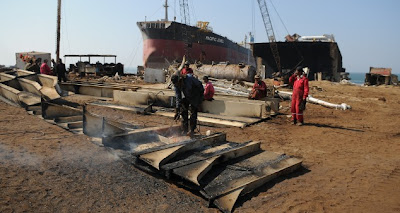Industries Minister Dilip Barua on Wednesday said the government is going to finalise Ship Breaking and Ship Recycling Board Act soon as it wants green industrialisation in the country with zero risk as well as zero pollution.
Seeking cooperation from world community to establish a green shipbreaking industrial sector in Bangladesh, he urged foreign experts to invest their knowledge, expertise, wisdom and finance for setting up a hi-tech ship recycling sector for the betterment of the future generation.
The minister was addressing as the chief guest a roundtable discussion on Promoting Sustainable Finance in Ship Recycling Industry in Bangladesh.
Dutch and German embassies in collaboration with different development financial institutions and partners like- FMO, DEG, IFC, Proparco organised the roundtable at a hotel in Dhaka on Wednesday.
SK Sur Chowdhury, Deputy Governor of Bangladesh Bank, Gerben Sjoerd De Jong, Ambassador of the Netherlands to Bangladesh, Dr. Ralf Reusch, Deputy Head of Mission of Germany in Bangladesh, Jurgen Rigterink, Chief Investment Officer, FMO, Nikos Mikelis, Industry Expert, former head of Ship Recycling Unit, IMO, Ali Reza Iftekhar, Managing Director and CEO of Eastern Bank Limited, attended.
Highlighting the strength of Bangladesh economy, Barua said, despite the recent global economic crisis, Bangladesh’s undisturbed and consistent growth over the past decade has proved the resilience of its economy. Its favorable investment climate has been lauded by many around the world.
Bangladesh, as a vibrant economy, maintained a consistent growth rate over 6 percent. With a population of 160 million, the country boasts of an efficient and entrepreneur workforce that is changing the profile of the economy, he said.
Laying emplasis on drawing a meaningful roadmap, he said the roadmap would help establish the much desired ship recycling industrial sector in line with the spirit of National Industrial Policy-2010 of the present grand alliance government, he expected.
“We are giving more thrust on the establishment of knowledge based hi-tech industries. Our vision is to make an industrialised Digital Bangladesh by 2021. In order to materialise our dream into reality we have been pursuing a liberal investment and industrial policy for foreign investors with huge attractive incentive package,” said the minister.
He invited the investors of the Netherlands, Norway and Germany to invest directly or relocate their sophisticated hi-tech ship recycling industries in Bangladesh.
Ship building, breaking and recycling is a profitable industry in Bangladesh and the Chittagong shipbreaking zone is becoming the hub of shipbreaking industries gradually, mentioned the minister.
At present Bangladesh is the second largest shipbreaker of the world with around 25 percent of world’s recycling capacity.
Source: Daily Sun. 20 June 2013




